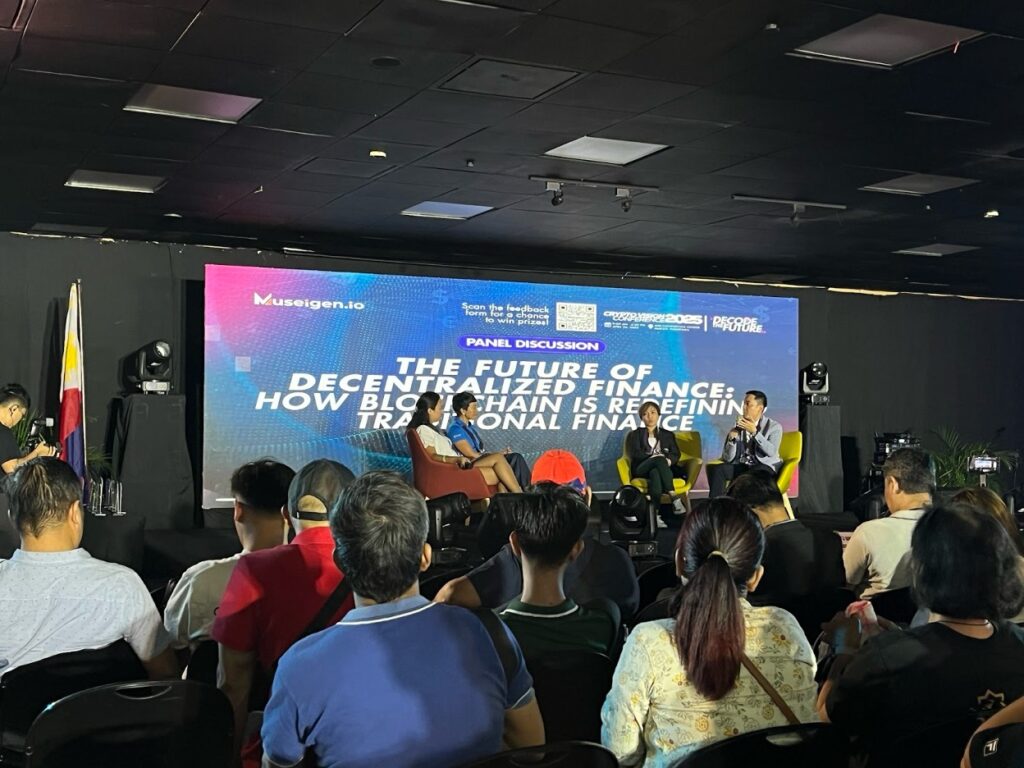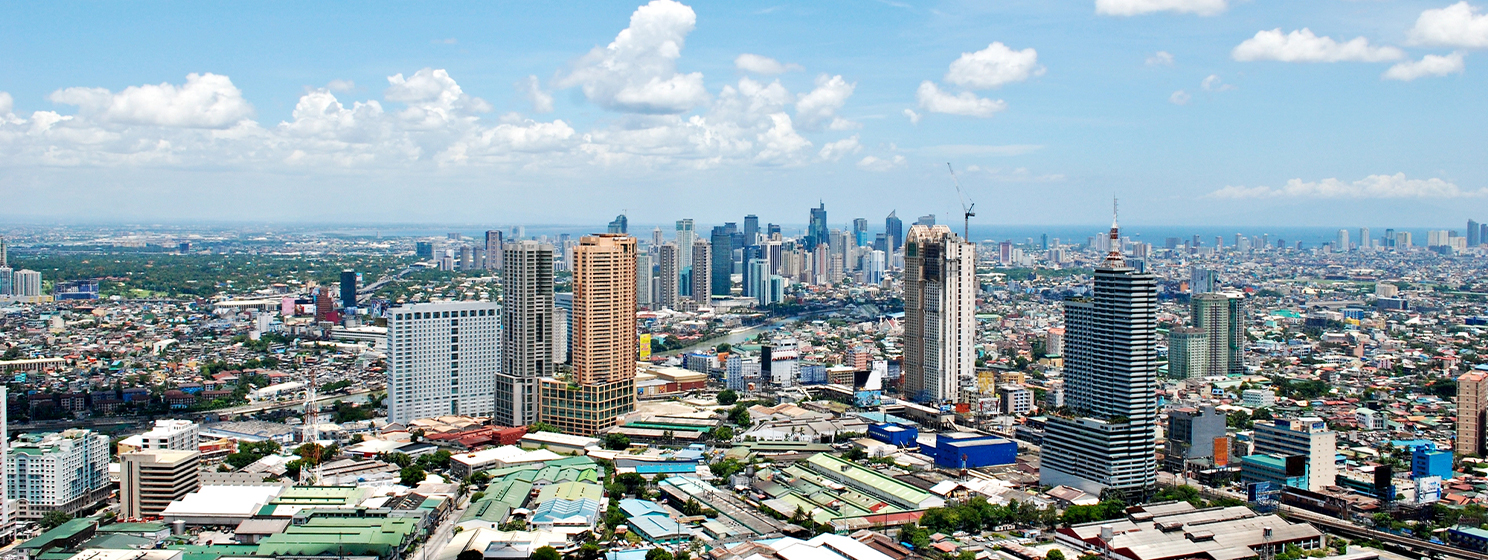|
Getting your Trinity Audio player ready...
|
Blockchain technology is redefining the financial landscape in the Philippines—reshaping how money moves, who has access, and what opportunities are available. In a panel discussion during the recently concluded Crypto Vision Conference 2025 in Makati City, leaders from UnionBank, Coins.ph, and Yield Guild Games (YGG) explored how this emerging infrastructure is challenging traditional systems and opening new possibilities for users across economic levels.
Speaking to a room of professionals, regulators, and tech enthusiasts, the panellists addressed real-world blockchain applications, the urgent need for modernization in finance, and how digital tools are creating alternatives for Overseas Filipino Workers (OFWs).

UnionBank’s take on blockchain
Robert Joseph Dela Cruz, Head of Digital Assets at UnionBank of the Philippines, shared the institution’s approach to
integrating blockchain into its operations. “I think the technology itself gives us a lot of power to create different products that we can actually offer to our clients or to governments,” Dela Cruz said. He cited UnionBank’s various pilot initiatives, including a digital currency app called BitBox, as part of their effort to make digital currency more accessible.
Far from seeing themselves in competition with exchanges, Dela Cruz explained UnionBank’s collaborative approach: “We are really actually working with them. It’s a community—all of us, YGG, Coins.ph, and all the other exchanges and everyone in DeFi—that allows us to give access to our clients.”
He described real-world applications of blockchain, such as logistics, where transparency and traceability are improved through decentralized systems. However, he acknowledged hurdles. “The challenge is adoption with other banks. We need to be in the same network, the same community, to be able to implement this on a wider scale.”
“It’s really more allowing the users themselves to tell us what they want from their banking experience,” he said. “If blockchain is a solution to that, then we will go that route. But otherwise, if it’s not, we won’t force that kind of technology.”
Coins.ph on modern finance
Jen Bilango, Country Manager at Coins.ph, said inefficiencies are embedded in traditional financial systems. “You can send an email in one second. Why can’t I receive money in a second?” she asked. For Bilango, the promise of blockchain lies in its ability to provide a more adaptive and modern financial foundation.
“The fundamental foundation of how we interact in our financial lives will be different,” she asserted. “There will be a point in which there will be an intersection,” referring to blockchain and traditional finance eventually merging. However, she also emphasized the importance of regulation in building user trust. “You don’t care about regulation until you’ve lost your money,” she said.
Bilango also shared her experience transitioning from a traditional finance role to blockchain. “I used to do IPOs (initial public offering). It takes me six to twelve months. Then all of a sudden, five people raised money in three weeks,” she said, recounting a pivotal moment. “My work will be gone in ten years because you can raise money from everyone. It’s the best kind of crowd-sourcing.”She argued that financial processes like remittances, which are vital to Filipinos, are ripe for disruption. “Remittances should be disrupted,” she stated. “I can send money to anyone around the world just like that, if you use the right chain.”
According to the September 2023 data of the Philippine Statistics Authority (PSA), the number of OFWs or Filipino workers who worked abroad from April to September 2023 was estimated at 2.16 million, an increase of 9.8% from the previous year’s estimated number of 1.96 million.
Grassroots innovation and the rise of the Metaverse Filipino Worker
Mench Dizon, Country Head of Yield Guild Games (YGG), highlighted a different angle of blockchain adoption—its unexpected grassroots momentum fueled by gaming. “We all expected adoption to come from some fintech or finance product, but it actually came from games,” she said. “Several millions of Filipinos started to learn about blockchain, about Web3, about crypto, because they were playing games.”
Dizon described how the gaming ecosystem introduced average users to the blockchain. “That is what’s very interesting to us—how adoption can really trickle via these products in the DeFi space, via games, via Web3 projects.”
She also discussed a movement initiated by YGG called the Metaverse Filipino Worker, aimed at expanding local economic opportunities without requiring overseas employment. “Remittances is one gap that DeFi could bridge, but we could go steps further,” she explained. “How can we actually provide the opportunities back home here —provide work, provide learning, provide capabilities?”
For Dizon, the ultimate impact of decentralized finance (DeFi) lies in its potential to offer an alternative to migration. “There even is no discussion of remittances because the Filipinos have a choice not to leave the country, but stay here, be with their families, be with their kids as they are growing up, and continue to be digital workers.”
She also stressed the importance of community-led education and support. “It’s not a safe space— we know that,” she said, referencing the risks in the crypto space. “But within the community, we see each of the members help each other understand this space that’s very hard to navigate.”
Balancing innovation and safety
The industry leaders agreed that while blockchain offers new possibilities, careful attention must be paid to user protection and regulatory compliance. Bilango highlighted the need for balance. “The regulators are concerned about how we make sure it’s safe for the people— AML, KYC because we’re part of a broader ecosystem.”
With financial inclusion, community-driven education, and emerging technologies converging, the panel underscored that decentralized finance is not just a tool for innovation but a potential pathway to rethinking economic participation from the ground up.
Watch | The Philippines startup boom: Highlights from Sinigang Valley Build Startup Festival

 02-15-2026
02-15-2026 




